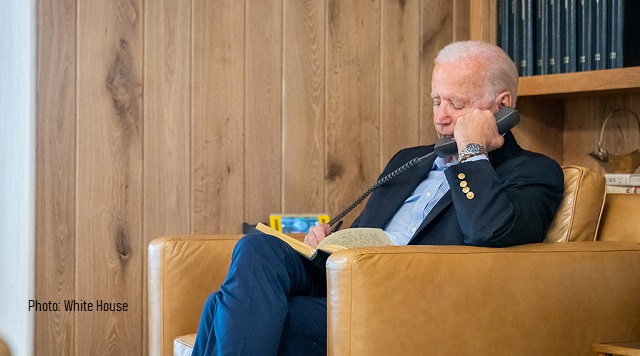VIDEO: Biden’s Debacle in Afghanistan

During this special Center for Security Policy webinar, three top national security experts who worked for the Trump National Security Council discussed the current crisis in Afghanistan caused by President Biden’s decision to abruptly withdraw all U.S. troops from the country.
Moderating the panel was Center President Fred Fleitz. Fleitz served as National Security Council Chief of Staff and is a former CIA analyst. Joining Fleitz was Dr. Victoria Coates and Robert Greenway.
Dr. Coates is Director of the Center’s Program on the Middle East and North Africa. During the Trump administration, she served as Deputy National Adviser and Senior Director for the Middle East and North Africa in the Trump National Security Council and as a senior adviser to the Secretary of Energy. Coates also served as national security adviser to Senator Ted Cruz.
Robert Greenway also served as a Deputy Assistant to the President and Senior Director for the Middle East and North Africa in the Trump National Security Council. He is currently an Adjunct Fellow at Hudson Institute. Greenway had a distinguished career as an Army intelligence officer and served three tours in Afghanistan. These included in 2001 as the Operations Officer for a Special Mission Unit; in 2011 as Senior Intelligence Advisor to the Deputy Chief of Staff for Intelligence and Senior Intelligence Advisor to the Commander, International Security Assistance Forces; and in 2014-15 as Senior Intelligence Advisor to the Commander Combined Special Operations Task Force Afghanistan/NATO Joint Special Operations Component Command-Afghanistan.
The panel engaged in a wide-ranging discussion on the reasons for the rapid fall of Afghanistan to the Taliban, including Biden’s order for a rapid withdrawal of U.S. troops and problems with the Afghan military.
Greenway discussed security issues in Kabul, including the mission of the 5,000 U.S. troops recently sent to the Kabul airport to evacuate U.S. citizens. He did not see how American citizens will be able to make their way to the airport to be evacuated. Greenway also discussed the close relationship between the Taliban and Pakistan and the vast array of arms left behind by the U.S. military now in the hands of the Taliban.
Coates said regarding the catastrophic breakdown of normal planning for such a withdrawal, “I can’t fix the last eight weeks but can I fix the next eight weeks? I do not think we faced a binary choice between the debacle we have now and 100,000 U.S. troops in Afghanistan.”
Coates went on, “The Taliban appear to have discovered the art of the public relations and their theme appears to be ‘This is not your father’s Taliban.’” While Coates expressed skepticism that the new Taliban are substantively different from the old Taliban, she recommended scrutiny of their actions, and that the U.S. government consider providing uncensored satellite-based internet access to more remote areas of Afghanistan where the Taliban might deploy violent, repressive terrorist tactics against Afghanis with no way to communicate their crimes to the outside world.
Fleitz stressed the Afghanistan crisis is a huge embarrassment for the United States and for President Biden. Fleitz primarily put the blame on Biden for his decision to suddenly withdraw U.S. troops from Afghanistan without a plan and without consulting with the Afghan army or government or with America’s allies. He believes Biden should fire his national security team in response to this debacle and bring in national security experts with experience and gravitas who can better advise Biden to prevent him from making more ill-advised national security decisions in the future that undermine America’s reputation and security.
Coates and Greenway both observed that the abandonment of Bagram airbase north of Kabul was both dangerous and unnecessary. Based on their trip to the Al Asad airbase in Iraq with President Trump during Christmas, 2018, they suggested he would have been more appreciative of the strategic importance of this base.
Greenway pointed out that some $83 billion in U.S. arms and equipment had been abandoned to the Taliban, and while the terrorist group would have a difficult time maintaining and deploying much of it, they now control “one of the largest arms depots in the region.”
Both Coates and Greenway highlighted the looming 20th anniversary of the 9/11 al Qaida attacks on America that launched the Afghanistan operation in the first place, and the need to bring heightened vigilance to this anniversary. Greenway emphasized the long and loyal relationship between the Taliban and al Qaida and predicted that fresh terrorist attacks are close to inevitable: “Now it is simply a matter of when.”
EDITORS NOTE: This Center For Security Policy video is republished with permission. ©All rights reserved.


Leave a Reply
Want to join the discussion?Feel free to contribute!